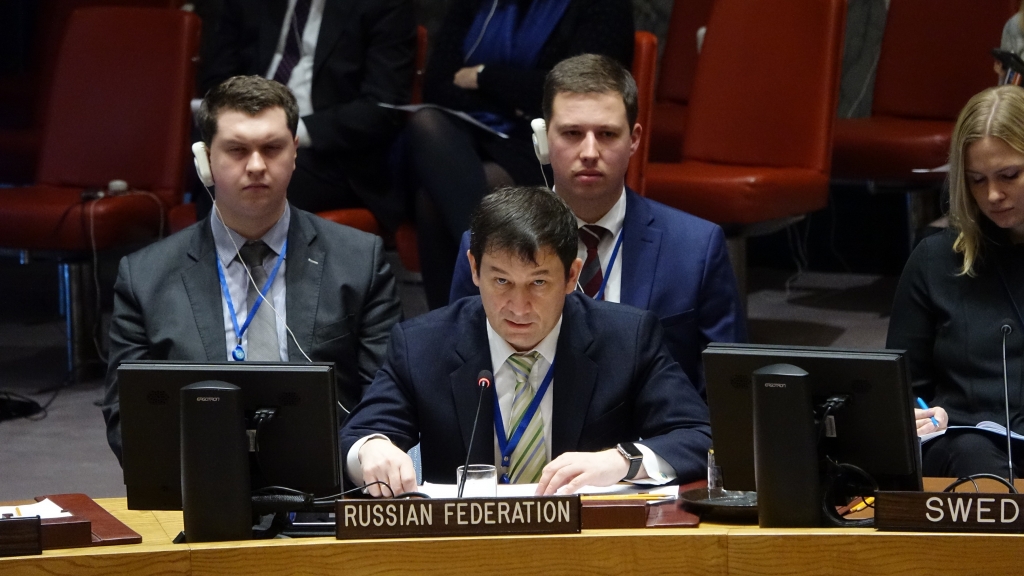Statement by Mr.Dmitry Polyansky, First Deputy Permanent Representative of the Russian Federation to the United Nations, at the Security Council on the peace and security in Africa
We thank Deputy Secretary-General Amina Mohammed for her informative briefing on the situation in the region of the Lake Chad basin. We also listened to the other briefers’ reports on the subject with interest.
For our part, we want to emphasize that the topic of today’s meeting appears to be “Peace and security in Africa”. It would therefore be logical to assume that we in the Security Council, in accordance with our mandate under the Charter of the United Nations and in the context of our consideration of the situation in the Lake Chad Basin region, will focus directly on the deplorable security situation. We are not arguing with the fact that there is a whole range of diverse problems that are undoubtedly exacerbating the overall situation in the region. The climate and habitat naturally have a serious impact on people’s lives.
However, there are other, more suitable, forums for discussing these issues — the Second Committee of the General Assembly, and the Economic and Social Council. There is no need to disrupt the existing division of responsibilities and overload the Security Council’s agenda. Any erosion of its mandate, and the consequent diminution of its effectiveness, must be guarded against.
By the way, we warned that this was potentially an issue when we voted on resolution 2349 (2017) last year, and we were not the only ones. We were not listened to at the time and, unfortunately, the resolution did not include the elements that would have helped to make it an effective tool for international efforts to assist the countries of the Lake Chad basin, particularly in the area of counter-terrorism.
I would like to stress that what we are talking about is fighting terrorism, not some conflict or other. In the relevant Security Council resolution, Boko Haram is classified as a terrorist organization. So where are we today, a year after the adoption of resolution 2349 (2017)? So far, Boko Haram still seems to feel entirely untrammelled. It has continued to commit terrorist acts and kidnap schoolgirls in the region, with regard to which the Council very recently issued another presidential statement (S/PRST/2018/3). Thank heaven that today we were informed that a large number of them have been released. Yet we were also shocked by the news of the possible tragic fate of the rest.
We are grateful to the Nigerian authorities for their counter-terrorism efforts in this regard. Boko Haram’s terrorist activity is a real threat to the States of the region. It undermines people’s settled lives, forces them to move to less dangerous areas and interferes with normal commercial and economic activity. Only when this challenge to an entire region is eliminated will it be possible to make significant progress in resolving other pressing problems and to undertake thorough efforts to prevent natural disasters and do away with their consequences. In this regard, I cannot help recalling the disastrous extent of the destabilization in the region after the collapse of the Libyan State.
Far from normalizing things in Libya, which we were discussing only yesterday (see S/PV.8211), it has continued to have a negative impact on the regional situation. I am not saying that in order to irritate anyone on the Council. It is a warning against undertaking such destructive regional ventures in future. After 2011, terrorism spread across the Sahel-Sahara region and West and Central Africa like a cancer and, despite every effort, it has continued to threaten the stability of countries in that part of Africa and even beyond its borders.
Unfortunately, we will be forced to wrestle with the consequences of the externally inflicted crisis in Libya, which include uncontrolled and illegal flows of arms and migrants and the spread of radical ideologies, for a long time to come. In that regard, we consider it important to continue to provide all possible assistance to countries that are fighting terrorists in strengthening their own national potential and encouraging the development of solid regional cooperation.
In this area, what is needed is cohesion, not competition, and a good example of that is the activities of the Multinational Joint Task Force of the States of the Lake Chad basin, which are doing a great deal to curtail Boko Haram’s activities.
We understand that security efforts should go hand in hand with advancing policies aimed at strengthening the institutions of State power and socioeconomic development. We note the efforts in that regard of the countries of the Lake Chad Basin Commission and the holding of a first conference on stabilizing the situation in the countries of the region. Efforts to find answers to the current problems based on the notion of African solutions to African problems can only be welcomed.
In conclusion, I would like to emphasize that Russia, as before, will continue to provide assistance to the States of the region both through international institutions and bilateral channels, without making our help conditional on any politically loaded demands.
